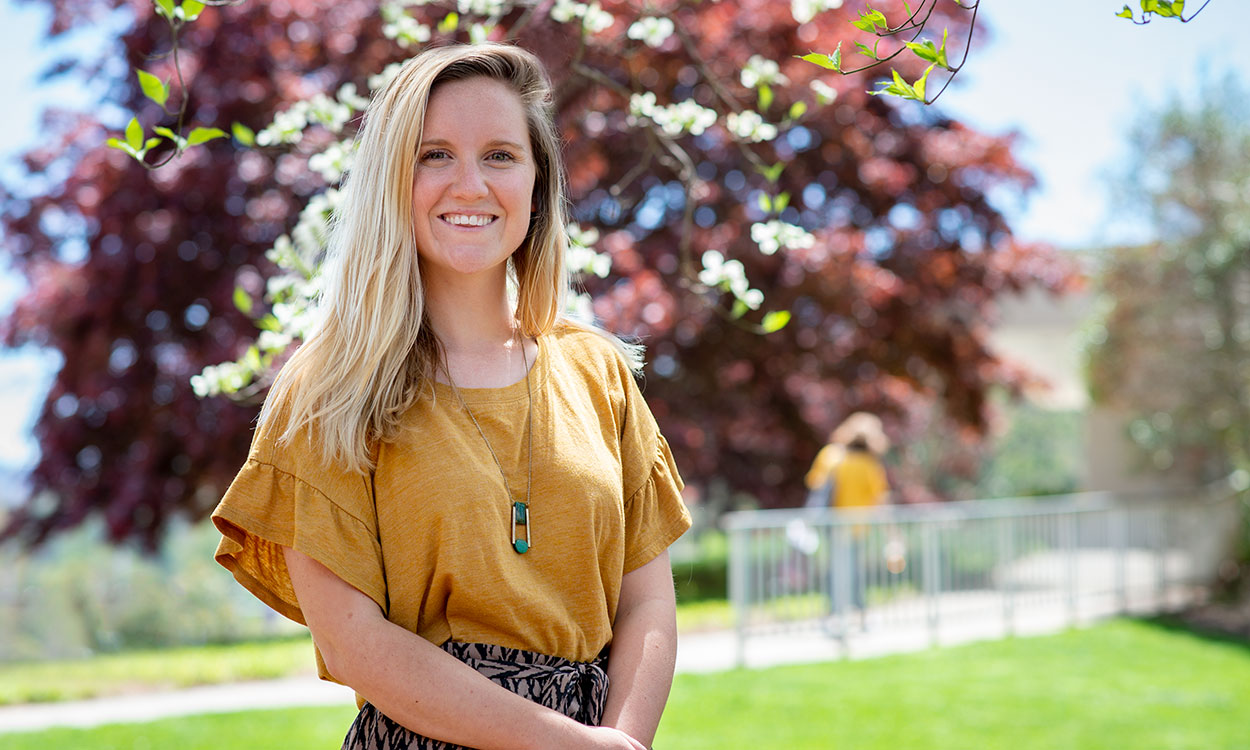She learned sign language as a middle schooler, now she’s a Fulbright scholar

Natalie Williams
A second-year Western Carolina University graduate student with a love for travel and communication has received a prestigious Fulbright award to teach English in Malaysia next year.
Natalie Williams, 24, will graduate in May with a master’s degree in speech-language pathology with a goal of becoming a speech-language pathologist. She’ll head to Southeast Asia in January 2020 for a 10-month assignment helping classroom teachers.
“I’m definitely excited,” said Williams. “It will help me discover other opportunities and help me to work with a more diverse group of people.”
As an English teaching assistant, which also is known as an "ETA," Williams will be placed in a secondary school to help teachers with classroom instruction and extracurricular activities pertaining to English language programs. But the ETA is more than a teaching experience abroad, according to a letter Williams received from the Malaysian American Commission on Educational Exchange announcing her award. “It is an important part of the U.S. State Department’s public diplomacy program in Malaysia and is given attention to the highest levels of government in the U.S. and Malaysia.”
Williams is well aware of the impact programs such as this have on educational institutions in other countries. Last year, she spent four weeks in Botswana with other WCU graduate students and faculty in communication sciences and disorders and special education, doing clinical work and helping develop lesson plans that could be adapted for their diverse classrooms. The program was funded by Fulbright money, but each individual participant was not.
“If you walked in to any designated classroom there you would see a 10-year-old and you’d see a 24-year-old in the same classroom depending on their ability,” Williams said. “You would see all different types of disabilities. We came up with lesson plans that could be adapted in any way possible for any student.”
Williams said her group’s effort in Botswana made a “huge impact” on the community and it made her want to do it again. “So, I applied and I got it,” she said.
Williams believes her speech therapy background may have helped her win the award, a specialty that not everyone who wants to teach English has.
“I can work on things with students using evidence-based practices I have learned that have to do not only with learning English, but the pronunciation and positioning of articulators as well, where people with English majors might not have the same expertise,” she said.
Williams first became interested in language and communication as a child when her grandfather told her about hymns in sign language he had learned as a child at a church for the deaf he attended with a deaf relative. Her interest piqued, she enrolled in a sign language class in middle school and became fluent. She used the skill as a camp counselor in high school to communicate with parents of a deaf child and again when she was in Botswana last year. It was a powerful feeling to be able use an alternative way to communicate with someone, she said.
“Sign language just makes sense,” Williams said. “It’s very intuitive. The signs that you use, you don’t even have to know sign language to know most of the time what they mean.”
From sign language, Williams became interested in other modalities of languages. “That’s what brought me to augmentative and alternative communication devices,” she said. “The best example most people understand is stuff for people who use devices to speak or eye gaze machines, like Stephen Hawking’s device. That’s something speech therapists work with a lot, so I got really, really interested in that side of speech.”
But for this trip to Malaysia, Williams said, her assignment is simple: teach English to middle and high school students in lower socio-economic schools.
“I think it’s really important to remember that I don’t go in with my ideas and think that’s the correct way to do things there,” she said. “That’s not really my objective. But I do think I do have some skills that can help with the production side in general. In that sense, it’s like, either way you’re going to be learning English, which is my expertise, so it’s perfect.”
The trip also scratches another itch for Williams: traveling abroad. Besides her trip to Botswana, she has been to France with her family and to India, where she spent six weeks helping to build a greenhouse for a community.
Her interest and participation in international issues did not go unnoticed by the Fulbright committee, which wrote in a letter to her announcing her award: “Your grant is a reflection of your leadership and contributions to society. Your selection for a Fulbright award is an achievement for which you can be justly proud.”
Brian Railsback, part-time director of WCU’s Office of National and International Awards, who helped facilitate Williams’ Fulbright application, and a full-time English professor, said Williams is the first Fulbright student scholar from WCU in more than 20 years. “Natalie’s Fulbright award is a direct result of her passion to learn and to teach,” Railsback said. “It’s great to know that our mentoring efforts at WCU have and will continue to produce awards like this Fulbright for our students. Natalie is a pioneer for us — her award sets up a new culture for WCU in terms of national and international awards. As awareness of awards programs spreads among faculty sponsors and fabulous students, I expect many will follow Natalie’s brilliant example.”
So why Malaysia? “I wanted to travel somewhere that would completely take me out of my comfort zone and force me to immerse myself in something completely different so I could learn more about others,” Williams said.
The idea that human beings can share their thoughts with others is what drives an intense desire in Williams to help people who struggle to communicate no matter their language.
“You can inspire people just through what you’re saying,” said Williams, “The fact that we’ve figured out a way to actually communicate our ideas and write them down and keep them so we can continue to learn things is really interesting to me. No other animal does that, where they’re able to share their history.”

